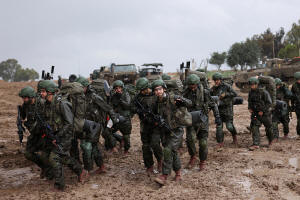Israel suffers worst combat losses since October, diplomatic isolation
 Send a link to a friend
Send a link to a friend
 [December 13, 2023]
By Nidal al-Mughrabi and Fadi Shana [December 13, 2023]
By Nidal al-Mughrabi and Fadi Shana
CAIRO/GAZA (Reuters) - Israel announced its worst combat losses for more
than a month on Wednesday after an ambush in the ruins of Gaza City, and
faced growing diplomatic isolation as civilian deaths mounted and a
humanitarian catastrophe worsened.
Intense fighting was under way simultaneously in the north and south of
the enclave, a day after the United Nations demanded an immediate
humanitarian ceasefire. U.S. President Joe Biden said Israel's
"indiscriminate" bombing of civilians was costing international support.
Warplanes again bombed the length of Gaza and aid officials said the
arrival of rainy winter weather worsened the conditions for hundreds of
thousands of families sleeping rough in makeshift tents. The vast
majority of Gaza's 2.3 million people have already been made homeless.
Israel launched its campaign to annihilate the Hamas militant group that
controls Gaza with global sympathy after fighters stormed across the
border fence on Oct. 7, killing 1,200 Israelis, mostly civilians, and
seizing 240 hostages.
But since then, Israeli forces have besieged the enclave and laid much
of it to waste, with more than 18,000 people confirmed killed according
to Palestinian health authorities, and many thousands more feared lost
in the rubble or beyond the reach of ambulances.

In Rafah, at the southern end of the Strip where hundreds of thousands
of people have sought shelter, the bodies of a family killed in an
overnight air strike were being laid out in the rain in bloodied white
shrouds, including several small children. One, only the size of a
newborn, was wrapped in a pink blanket.
Ahmed Abu Reyash collected the bodies of his nieces, Sama and Sara, aged
5 and 7. As he walked through the street carrying one of the girls, a
relative tugged at the shroud and shouted: "These are children!
Children! Do they kill anyone other than children? No! These are
innocents! They killed them with their dirty hands!"
Since a week-long truce collapsed at the start of December, Israeli
forces have extended their ground campaign from the northern Gaza Strip
into the south with the storming of the main southern city of Khan
Younis.
Meanwhile, fighting has only intensified amid the rubble of the north,
where Israel had previously claimed its military objectives had been
largely met.
Israel reported ten of its soldiers killed in the past 24 hours,
including a full colonel commanding a forward base and a
lieutenant-colonel commanding a regiment. It was the worst one-day loss
since 15 were killed on Oct. 31.
Most of the deaths came in the Shejaiya district of Gaza City in the
north, where troops were ambushed trying to rescue another group of
soldiers who had attacked fighters in a building, the military said.
'BRINGING DESTRUCTION AND DEATH'
Hamas said the incident showed that Israeli forces could never subdue
Gaza: "The longer you stay there, the greater the bill of your deaths
and losses will be, and you will emerge from it carrying the tail of
disappointment and loss, God willing."

[to top of second column]
|

Israeli soldiers prepare to enter the Gaza Strip, amid the ongoing
conflict between Israel and the Palestinian Islamist group Hamas, at
Israel's border with Gaza in southern Israel, December 13, 2023.
REUTERS/Ronen Zvulun

In the north, heavy fighting has also taken place in the Jabaliya
district, where Gaza health officials say Israeli forces have
besieged and stormed a hospital and detained and abused medical
staff.
In the south, Israeli forces storming Khan Younis advanced in recent
days to city centre. Residents said there was heavy fighting there
but no further attempts to advance in the last 24 hours.
“The Israeli tanks have not moved further from the centre of the
city. They are facing fierce resistance and we hear the exchanges of
fire, explosions too,” Abu Abdallah, a father of five who lives 2 km
away, told Reuters.
The Israelis had brought bulldozers and were destroying the road
near the Khan Younis home of the Hamas leader in Gaza, Yahya Al-Sinwar,
Abu Abdallah said.
Hospitals in the north have largely ceased functioning altogether.
In the south, they have been overrun by dead and wounded, carried in
by the dozen throughout the day and night.
"Doctors including myself are stepping over the bodies of children
to treat children who will die," Dr Chris Hook, a British physician
deployed with medical charity MSF at Nasser hospital in Khan Younis,
told Reuters.
International agencies say the limited aid reaching Gaza is being
distributed only in parts of Rafah near the Egyptian border. Even
there, the situation has become far more extreme this week.
Gemma Connell, based in Rafah as Gaza team leader for the U.N.
humanitarian office OCHA, told Reuters in a message: "Heavy rains
and winds overnight. So awful for all of these people in makeshift
shelters."
Israel says it has been encouraging increased aid to Gaza through
Egypt's border, and is announcing daily four-hour pauses in
operations near Rafah to help civilians reach it. The U.N. says
cumbersome inspections and insecurity have slowed aid to a trickle.
U.N. VOTE
The U.N. General Assembly vote demanding a ceasefire has no legal
force but was the strongest sign yet of eroding international
support for Israel's actions. Three-quarters of the 193 member
states voted in favor and only eight countries joined the United
States and Israel in voting against.

Before the vote, Biden said Israel still has support from "most of
the world" for its fight against Hamas.
"But they're starting to lose that support by indiscriminate bombing
that takes place," he told a campaign donor event.
In the most public sign of division between the U.S. and Israeli
leaders so far, Biden said Prime Minister Benjamin Netanyahu needed
to change his hardline government, and that ultimately Israel "can't
say no" to an independent Palestinian state, opposed by far-right
members of the Israeli cabinet.
(Reporting by Bassam Massoud in Khan Younis, Gaza, Nidal al-Mughrabi
in Cairo, Maggie Fick in London and Reuters bureaux; Writing by
Peter Graff; Editing by Nick Macfie)
[© 2023 Thomson Reuters. All rights
reserved.]This material
may not be published, broadcast, rewritten or redistributed.
Thompson Reuters is solely responsible for this content. |